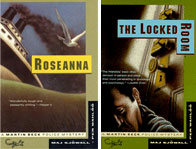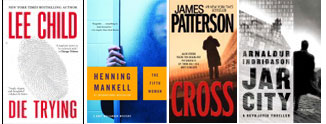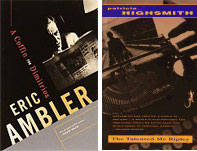
Claiborne’s voice is that of a prophet. A loving and patient (not angry) prophet.
His views on pacifism particularly made me think. In our world, pacifism is not realistic, not popular, not how things work. But Claiborne painted a picture of Jesus that is not compatible with violence; a picture that, I realized, lined up with everything I knew about Jesus from Scripture.
I didn’t change my views and become a pacifist. But the feeling deep in my gut told me, “There’s something here, something central to who Jesus is. Don’t discount it.”
These themes are continued in Claiborne’s recent book “Jesus for President.” First, let me say that the graphic design of the book is phenomenal. The most creative design I’ve ever seen.
As for the content? Disappointing, overall. A bit bloated. Plenty of good stuff, but nothing like “The Irresistible Revolution.”
The best passage in “Jesus for President” was a speech given by Father George Zabelka, the Catholic Air Force chaplain who blessed the crews who dropped the atomic bombs on Hiroshima and Nagasaki. Over the next 20 years, Zabelka came to renounce violence. Zabelka’s speech, given on the 40th anniversary of the bombings, is an eloquent argument for nonviolence.
“There is no way to follow Christ, to love as Christ loved, and simultaneously to kill other people. It is a lie to say that the spirit that moves the trigger of a flamethrower is the Holy Spirit. It is a lie to say that learning to kill is learning to be Christ-like. It is a lie to say that learning to drive a bayonet into the heart of another is motivated from having put on the mind of Christ. Militarized Christianity is a lie. It is radically out of conformity with the teaching, life, and spirit of Jesus.”
Now, let me state that I’m not a pacifist. I support the invasion of Afghanistan (not of Iraq), and I certainly support fighting the Germans and Japanese. It’s one of the things governments do–defend their people. I believe in redemptive violence, within limits.
And yet…my beliefs are pricked by Claiborne’s writings. We Americans are so militaristic, and we think God is always on our side, blessing our fire-bombings. But can you see Jesus firing an M-16 to kill another person? I honestly can’t. And if I’m to be like Christ….
So I’m intrigued with the pacifist arguments. There’s something there, something central to the nature of Christ. Something I want to understand, but which is way beyond my comprehension right now.
Claiborne takes things much further than I feel comfortable with. In Claiborne’s world, you can’t be a soldier, and he gives examples of soldiers who have been convicted about nonviolence and have left the military. But what does that say about all the Christians serving in the military? Does God never call anyone to serve in uniform? Is a Christian colonel misled if he says, “I’m right where I believe God wants me to be”?
I’m not willing to put the “unbiblical” label on my Dad or anyone else who has served in the military. I think God is mysterious enough, beyond our understanding, to call one person to pacifism and another to a life of military service. I don’t think that’s inconsistent; Claiborne, who has studied this far more than me, would say it is.
Anyway, Claiborne makes me think. He forces me to look at my lifestyle, my attitudes, my assumptions ingrained from growing up in America. His advocacy of the poor is something I absolutely cannot dispute, though his lifestyle takes things well beyond what I’m comfortable with. Let me state for the record that my comfort level is in no way a measure of my spirituality.


 “The Fine Line: Re-envisioning the Gap Between Christ and Culture,” by Kary Oberbrunner, is about how the Christian relates to our culture. There are separatists, who avoid the culture in order to remain pure. And there are conformists, who indulge in the culture. Most evangelicals I know would fall in the conformist camp. We like our TV shows, pop music, movies of whatever rating. We justify it by saying we need to relate to our secular culture. It’s a matter of relevance.
“The Fine Line: Re-envisioning the Gap Between Christ and Culture,” by Kary Oberbrunner, is about how the Christian relates to our culture. There are separatists, who avoid the culture in order to remain pure. And there are conformists, who indulge in the culture. Most evangelicals I know would fall in the conformist camp. We like our TV shows, pop music, movies of whatever rating. We justify it by saying we need to relate to our secular culture. It’s a matter of relevance. Martin Beck is the central figure of this detective series by Per Wahloo and Maj Sjowall. He’s a Swedish detective, and bears plenty of resemblance to Kurt Wallander, the detective in Henning Mankell’s books.
Martin Beck is the central figure of this detective series by Per Wahloo and Maj Sjowall. He’s a Swedish detective, and bears plenty of resemblance to Kurt Wallander, the detective in Henning Mankell’s books.

 Back in December, while killing time in Barnes & Noble, I began browsing through a copy of Barack Obama’s book “The Audacity of Hope.” I opened to a random page near the middle of the book, began reading–and immediately found myself disagreeing with something he said. It had to do with an interpretation of Scripture.
Back in December, while killing time in Barnes & Noble, I began browsing through a copy of Barack Obama’s book “The Audacity of Hope.” I opened to a random page near the middle of the book, began reading–and immediately found myself disagreeing with something he said. It had to do with an interpretation of Scripture.
 The best Christian book I read in 2008 is Larry Osborne’s “Contrarian’s Guide to Knowing God.” He takes some beliefs we’ve always held as true, and sheds a whole different light on them. He doesn’t stray from orthodoxy, only from our western paradigms and interpretations. His thoughts about how people grow are particularly fascinating (as in the chapter “The Case for Meandering”).
The best Christian book I read in 2008 is Larry Osborne’s “Contrarian’s Guide to Knowing God.” He takes some beliefs we’ve always held as true, and sheds a whole different light on them. He doesn’t stray from orthodoxy, only from our western paradigms and interpretations. His thoughts about how people grow are particularly fascinating (as in the chapter “The Case for Meandering”).

 This 1939 book roams from Turkey to Greece to Yugoslavia to Paris, as our protagonist, a writer of detective novels, researches the travels of a shady figure named Dimitrios. I could have used more action, but I definitely need to read more Ambler stuff. Very literature fellow.
This 1939 book roams from Turkey to Greece to Yugoslavia to Paris, as our protagonist, a writer of detective novels, researches the travels of a shady figure named Dimitrios. I could have used more action, but I definitely need to read more Ambler stuff. Very literature fellow.


